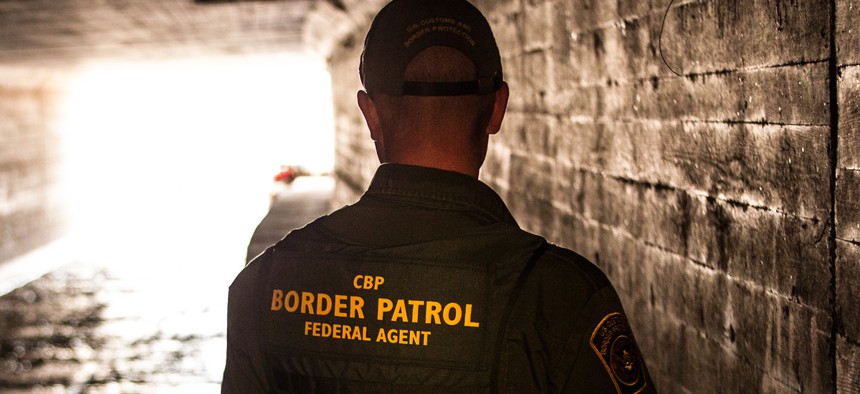
Josh Denmark/CBP file photo
At An Event To Honor the U.S. Border Patrol, Trump Continuously Flubbed Its Name
Customs and Border Protection may be a mouthful. Its acronym, CBP, is not.
The White House honored Customs and Border Protection, the 60,000-strong armed force that guards the U.S. borders, and the controversial Immigration and Customs Enforcement, the agency that patrols the U.S. interior, in the East Room Monday.
At the event, Donald Trump continuously referred to the border guard, known as the CBP, as the CBC. He also seemed to mix up the responsibilities of the two agencies. Trump, who received a big cheer from agents and officials when he took to the podium, read his speech from a teleprompter. Right away, he referred to the border group incorrectly, and then continued to use the wrong acronym for the entire speech.
Trump repeatedly referred to CBP (Customs and Border Protection) as "CBC" today. Twice here: pic.twitter.com/xnQduYfT92
— Matt Shuham (@mattshuham) August 20, 2018
The acronym wasn’t incorrect on the teleprompter, reporters in the room said.
It’s not the speechwriter’s fault.
— Jennifer Jacobs (@JenniferJJacobs) August 20, 2018
I’m standing next to the teleprompter Trump is reading from in the East Room and it says “CBP.”
But Trump has said “CBC” over and over. https://t.co/mqdW417VR2
Trump also said that any push to “abolish ICE,” was a “plan to abolish America’s borders,” adding he wasn’t getting funding for his promised border wall with Mexico “because Democrats just don’t mind crime.” In inviting CBP agent Adrian Anzaldua to the stage, Trump paused to note Anzaldua speaks “perfect English.”
Trump just introduced this border patrol agent name Adrian and said, "He speaks perfect English!" pic.twitter.com/R2wfP5fja1
— Christina Wilkie (@christinawilkie) August 20, 2018
The administration is embracing ICE as many Americans express concern about the agency’s targeting of undocumented immigrants who are not dangerous and about ICE’s role in separating asylum-seeking families at border. The event featured a panel discussion with top immigration officials led by a White House press person, with no mention of the separation policy.
There are still 541 children in U.S. government care who were separated from their parents, the Health and Human Services Department said last week. In 360 cases, a parent is no longer in the country, meaning he or she was likely deported by U.S. officials.
NEXT STORY: Communication Rules for Survival and Success






